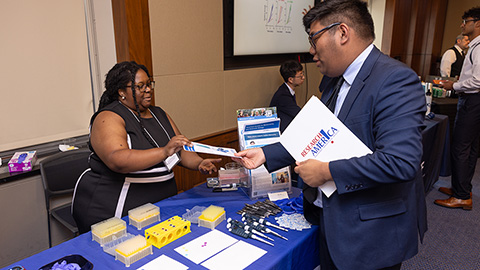
Funding opportunities to explore
Beyond the National Institutes of Health, a number of U.S. government agencies provided funding for basic scientific research. Here are some of them.
U.S. Department of Agriculture

The USDA has a series of programs offered through the National Institute of Food and Agriculture specifically to help minority serving institutions strengthen research capacity, increase student recruitment and retention and conduct outreach to diverse communities. For example, the 1890 Land-Grant Institutions Programs support historically Black universities and the Tribal College Research Grant Program helps 1994 Land-Grants become centers of scientific inquiry and learning for remote and rural reservation communities. Learn more.
National Institute of Aging

National Library of Medicine

The NLM offers numerous grants related to fundamental research in biomedical informatics and data science. For example, it has an exploratory/developmental research grant program that supports early and conceptual work and feasibility in tests in biomedical informatics. Learn more.
Department of Energy

The DOE funds over 6,000 scientists through its Basic Energy Sciences program, which supports basic research to lay the foundations for new energy technologies. The DOE also has an Early Career Research Program for outstanding scientists just starting out. Learn more.
National Science Foundation

The NSF supports research, through its Directorate for Biological Sciences, that advances the frontiers of biological knowledge. The directorate funds, among other things, research traineeships, research experiences for undergraduates and infrastructure grants to advance biology and biotechnology. Learn more about the directorate at nsf.gov/bio/about.jsp.
Enjoy reading ASBMB Today?
Become a member to receive the print edition four times a year and the digital edition monthly.
Learn moreFeatured jobs
from the ASBMB career center
Get the latest from ASBMB Today
Enter your email address, and we’ll send you a weekly email with recent articles, interviews and more.
Latest in Policy
Policy highlights or most popular articles

Embrace your neurodivergence and flourish in college
This guide offers practical advice on setting yourself up for success — learn how to leverage campus resources, work with professors and embrace your strengths.

ASBMB honors Lawrence Tabak with public service award
He will deliver prerecorded remarks at the 2025 ASBMB Annual Meeting in Chicago.

Summer internships in an unpredictable funding environment
With the National Institutes of Health and other institutions canceling summer programs, many students are left scrambling for alternatives. If your program has been canceled or delayed, consider applying for other opportunities or taking a course.

Black excellence in biotech: Shaping the future of an industry
This Black History Month, we highlight the impact of DEI initiatives, trailblazing scientists and industry leaders working to create a more inclusive and scientific community. Discover how you can be part of the movement.

ASBMB releases statement on sustaining U.S. scientific leadership
The society encourages the executive and legislative branches of the U.S. government to continue their support of the nation’s leadership in science.

ASBMB and advocacy: What we accomplished in 2024
PAAC members met with policymakers to advocate for basic scientific research, connected some fellow members with funding opportunities and trained others to advocate for science.

